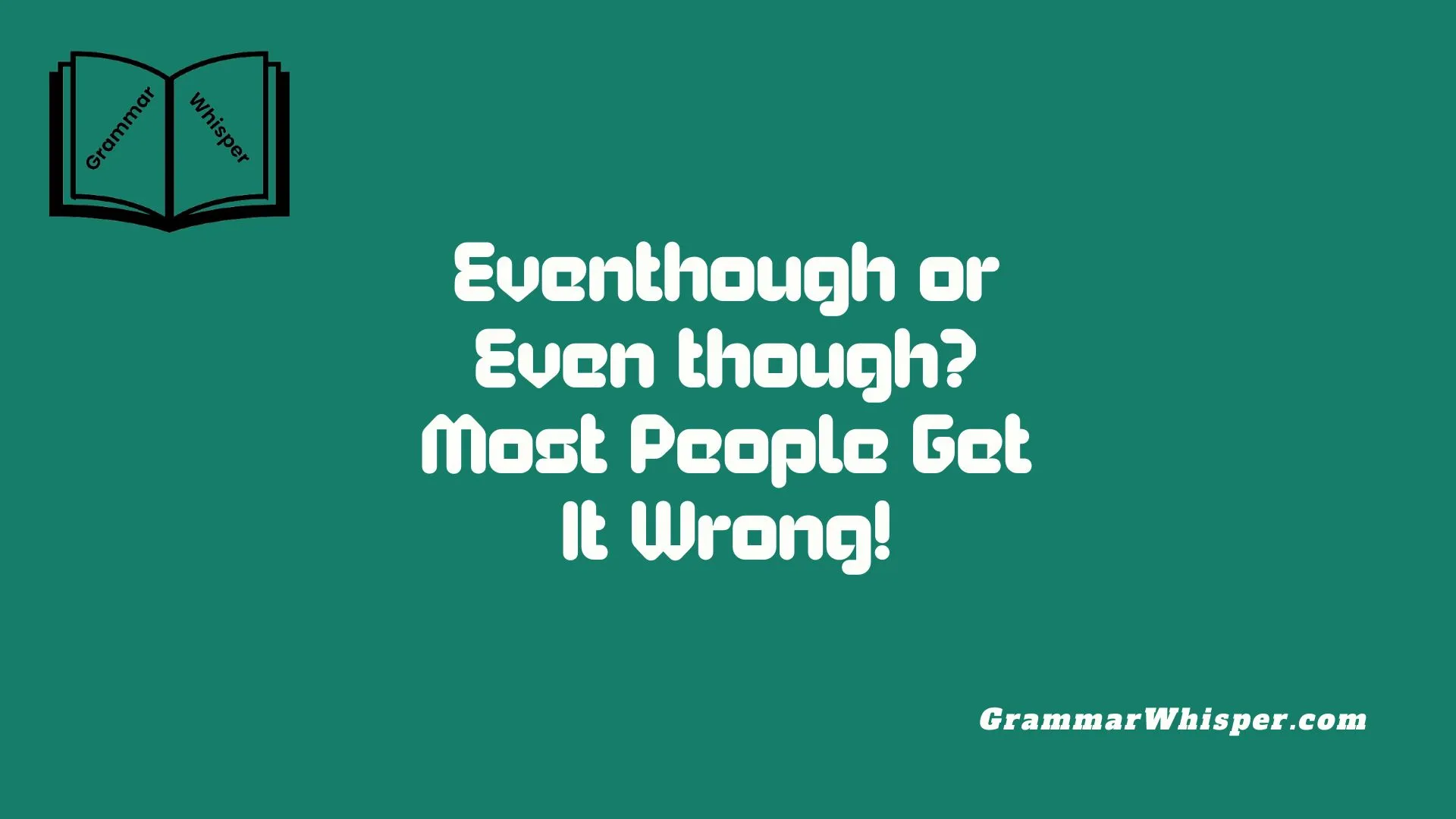In today’s digital world, where screens suggest edits nonstop and tools like spellcheck or autocorrect jump in to help, it’s easy to assume a word is right if it simply looks correct. But one tiny space, or the lack of it, can totally alter the correctness of a sentence. I once submitted an article using “eventhough,” and my editor treated it like a red-flag error. The case was clear: in American English, “even though” is the only correct form—and that little space makes a big difference.
Through experience, I’ve learned that good grammar is less about being perfect and more about clarity, credibility, and the ability to express contrast without tripping the reader. If you’ve ever wondered why something this small matters, you’re in the right place. “Eventhough” is a common typo—probably caused by lazy typing or predictive tech. Still, getting it wrong hurts more than you’d expect, especially if clarity and professionalism matter to you.
Understanding the Confusion: Why “Eventhough” Seems Plausible
Let’s be real – “eventhough” looks like it could be a word. After all, we accept compounds like “everything,” “everywhere,” and “everyday” without question.
Here’s where the confusion comes in:
- Spoken quickly, “even though” blends together.
- Some compound words follow similar visual patterns.
- Many spellcheck tools don’t flag “eventhough” as clearly incorrect.
So why isn’t “eventhough” correct? Because it simply doesn’t exist in standard English.
The Official Rule: Why “Even though” Is the Only Correct Form
“Even though” is a subordinating conjunction – a word pairing that connects a dependent clause to an independent one to express contrast or contradiction.
Here’s the breakdown:
| Word | Function |
| Even | Emphasizes contradiction |
| Though | Signals contrast |
Together, they form a logical connector like:
“Even though it was late, she kept studying.”
“Eventhough,” on the other hand, has no grammatical basis or recognized meaning in American English. It’s not a conjunction. It’s not a noun. It’s not anything.
Origin & Historical Usage of “Even though”
The phrase “even though” has its roots in Middle English, combining the Old English word þēah (“though”) and the intensifier efne (“even”).
- “Though” has been in use since the 12th century.
- “Even” as an intensifier emerged in the 14th century.
- Combined use: Common by the 18th century in British and American English.
It’s always been two words. Historical texts, including Shakespearean plays and early American literature, consistently separate them.
Why “Eventhough” Is Always Considered Incorrect
Let’s be blunt: “Eventhough” is not a real word. Not in American English, not in British English, not in Canadian, Australian, or any formal version of English.
Trusted Sources Say So:
| Source | Status of “Eventhough” |
| Merriam-Webster | Not listed |
| Cambridge Dictionary | Not recognized |
| Oxford English Dictionary | No entry |
| Grammarly | Flags it as a typo |
| Chicago Manual of Style | Advises correct usage: “even though” |
When something doesn’t exist in any respected dictionary or linguistic corpus, you can be confident it’s incorrect.
Impact of Incorrect Usage: Does It Really Matter?
You might be thinking, “But people will still understand me, right?”
Yes – but that doesn’t mean it’s acceptable. In professional, academic, and polished writing, minor mistakes can lead to major impressions.
Here’s how it affects you:
- In academic writing: May lose marks or credibility
- In resumes or cover letters: Appears careless or unprofessional
- In business communication: Weakens your authority or brand
Typos signal laziness – even when they’re common. Especially in industries like publishing, education, and law, such errors can be deal-breakers.
Common Misconceptions and Urban Grammar Myths
Myth 1: If “everywhere” is right, so is “eventhough” ✅ Truth: “Everywhere” is a noun/adverb. “Even though” is a conjunction – it doesn’t follow the same rules.
Myth 2: My phone doesn’t correct it, so it must be fine ✅ Truth: Autocorrect tools aren’t infallible. Many won’t catch subtle or context-specific errors.
Myth 3: I’ve seen it online, so it must be acceptable ✅ Truth: Internet forums are riddled with misspellings. Popular usage ≠ correct usage.
Usage in Context: How to Use “Even though” Naturally
The best way to remember grammar? Use it in real sentences.
Examples:
| Correct Usage | Explanation |
| “Even though it rained, the event was a success.” | Shows contrast between the weather and the outcome |
| “She smiled even though she was nervous.” | Contrasts emotion with outward reaction |
| “Even though they disagree, they respect each other.” | Links two conflicting but related ideas |
Notice how “even though” is always two words, and always introduces contrast.
Common Mistakes and What to Avoid
Even skilled writers fall into certain traps. Here’s what to watch for:
⚠️ Pitfalls:
- Writing “eventhough” in haste
- Using “even though” and “even if” interchangeably
- Forgetting commas in longer sentences (though “even though” doesn’t usually require one directly after)
✅ Fixes:
- Double-check during editing
- Use grammar tools like Hemingway or Grammarly
- Practice identifying it in books or blogs
Pronunciation vs. Spelling: Why the Ear Tricks the Eye
Here’s where your ears betray your grammar.
When you say “even though” quickly, it can sound like one mashed word:
“Ev’nthough”
But the fact that we say it fast doesn’t mean we write it that way.
Quick Tip:
Read your writing out loud. Your mouth will often catch what your eyes missed.
Global Insight: Do Other Languages Combine This Phrase?
In other languages, conjunctions work differently. Here’s how a few translate “even though”:
| Language | Translation | Literal Meaning |
| Spanish | “aunque” | Although / even though |
| French | “même si” | Even if |
| German | “auch wenn” | Even if / even though |
| Chinese (Mandarin) | “即使” (jíshǐ) | Even if / even though |
None of these are combined single words. The phrase structure exists, but it’s always made up of multiple components.
Digital Influence: Spellcheck, Autocorrect & Internet Language
While writing tools help, they’re not perfect.
Consider this:
- Grammarly detects “eventhough” as incorrect
- Google Docs sometimes misses it
- Mobile keyboards (especially Android) often autocorrect to it after repeated use
Don’t rely solely on technology. Develop the habit of manual proofreading – especially for high-stakes writing.
Memory Tricks & Mnemonics to Remember the Correct Form
Need help making it stick? Try these tricks:
- Two ideas = two words: Even though connects conflicting ideas, so keep the words separate.
- “Even though” is like two stepping stones: One for the setup, one for the contrast.
- Say this aloud: “If in doubt, break it out.” It’ll remind you to keep “even” and “though” apart.
Quick Grammar Check: When to Use “Even though” vs. Other Conjunctions
“Even though” doesn’t work in every case. Here’s how it stacks up:
| Phrase | Use Case | Example |
| Even though | Fact that contradicts | “Even though I was tired, I kept going.” |
| Although | Slightly more formal | “Although I tried, I failed.” |
| Though | Casual/shortened | “I liked it, though.” |
| Even if | Hypothetical | “Even if it rains, I’ll go.” |
Real-Life Applications: Fixing Your Writing Instantly
How to audit your writing:
- Search for “eventhough” in your drafts. Replace it.
- Check sentence purpose: Does it express contrast? If yes, “even though” fits.
- Use editing tools – but verify. Machines miss things humans won’t.
Example Fix:
- ❌ “Eventhough she apologized, I didn’t believe her.”
- ✅ “Even though she apologized, I didn’t believe her.”
Why It Pays to Get It Right
Your grammar says a lot about you. In an era of texts, tweets, and DMs, clean, correct language can help you stand out in:
- Job applications
- Professional emails
- Academic papers
- Blogging and content writing
Using the correct form of “even though” not only shows your attention to detail but also strengthens your credibility.
“Precision in language equals clarity in thought.”
Final Thoughts
Choosing between “eventhough” and “even though” may seem minor, but it’s one of those details that separates polished, professional writing from sloppy or careless mistakes. In American English, the correct form is always “even though” – two separate words working together as a powerful conjunction to express contrast or concession.
Remember, “eventhough” is not a real word, no matter how often you might see it online. It’s not found in dictionaries, approved by grammar guides, or accepted in formal writing. Its growing appearance in informal digital spaces doesn’t legitimize its use – especially in academic, business, or high-stakes communication.
What is the correct spelling: “eventhough” or “even though”?
“Even though” is the correct spelling. It’s a subordinating conjunction that connects two clauses. “Eventhough” is a common typo or misunderstanding but is not accepted in standard English writing.
Why is “eventhough” considered incorrect in American English?
Because “eventhough” doesn’t exist as a recognized word. It’s not in dictionaries, grammar books, or official style guides. It’s a blend that occurs from fast speech or typing but lacks linguistic validity.
Can I use “even though” at the start of a sentence?
Yes, you can start a sentence with “even though.” Just make sure it’s followed by a dependent clause and then completed with an independent clause to maintain grammatical correctness.
Is “even though” more formal than “though” or “although”?
Yes, “even though” carries more emphasis than “though” or “although.” It expresses stronger contrast or contradiction and is commonly used in both spoken and written American English.
How can I remember to use “even though” correctly?
Try this trick: Two contrasting ideas? Use two words. The phrase introduces contradiction, so keep “even” and “though” separate – just like the ideas they connect. Mnemonics or reading aloud can also help.











